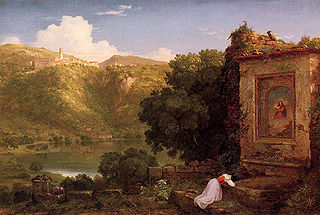Related Research Articles

John Milton was an English poet, polemicist, and civil servant. His 1667 epic poem Paradise Lost, written in blank verse and including twelve books, was written in a time of immense religious flux and political upheaval. It addressed the fall of man, including the temptation of Adam and Eve by the fallen angel Satan and God's expulsion of them from the Garden of Eden. Paradise Lost elevated Milton's reputation as one of history's greatest poets. He also served as a civil servant for the Commonwealth of England under its Council of State and later under Oliver Cromwell.

Samson Agonistes is a tragic closet drama by John Milton. It appeared with the publication of Milton's Paradise Regained in 1671, as the title page of that volume states: "Paradise Regained / A Poem / In IV Books / To Which Is Added / Samson Agonistes". It is generally thought that Samson Agonistes was begun around the same time as Paradise Regained but was completed after the larger work, possibly very close to the date of publishing, but there is no certainty.

Il Penseroso is a poem by John Milton, first found in the 1645/1646 quarto of verses The Poems of Mr. John Milton, both English and Latin, published by Humphrey Moseley. It was presented as a companion piece to L'Allegro, a vision of poetic mirth. The speaker of this reflective ode dispels "vain deluding Joys" from his mind in a ten-line prelude, before invoking "divinest Melancholy" to inspire his future verses. The melancholic mood is idealised by the speaker as a means by which to "attain / To something like prophetic strain," and for the central action of Il Penseroso – which, like L'Allegro, proceeds in couplets of iambic tetrameter – the speaker speculates about the poetic inspiration that would transpire if the imagined goddess of Melancholy he invokes were his Muse. The highly digressive style Milton employs in L'Allegro and Il Penseroso dually precludes any summary of the poems' dramatic action as it renders them interpretively ambiguous to critics. However, it can surely be said that the vision of poetic inspiration offered by the speaker of Il Penseroso is an allegorical exploration of a contemplative paradigm of poetic genre.
The Tenure of Kings and Magistrates is a book by John Milton, in which he defends the right of people to execute a guilty sovereign, whether tyrannical or not.
Of Reformation is a 1641 pamphlet by John Milton, and his debut in the public arena. Its full title is Of Reformation Touching Church-Discipline in England.
Defension Secunda was a 1654 political tract by John Milton, a sequel to his Defensio pro Populo Anglicano. It is a defence of the Parliamentary regime, then controlled by Oliver Cromwell; and also defense of his own reputation against a royalist tract published under the name Salmasius in 1652, and other criticism lodged against him.
The Passion is an unfinished ode by John Milton that was possibly written in 1630 and was first published in 1645 or 1646. The poem connects Christ's Crucifixion with his Incarnation. It is linked to two other poems of Milton: On the Morning of Christ's Nativity and Upon the Circumcision
Arcades is a masque written by John Milton and performed on 4 May 1634. The piece was written to celebrate the character of Alice Spencer, the Countess Dowager of Derby, widow of Ferdinando Stanley, 5th Earl of Derby, during her 75th birthday. The masque distinguishes Spencer as having a greater far superior to other noble women by titling Spencer as queen of a metaphorical Arcadia that is far superior to any other realm. The piece served as a basis for Milton's later masque, Comus.
Of Prelatical Episcopacy is a religious tract written by John Milton in either June or July 1641.
Animadversions is the third of John Milton's antiprelatical tracts, in the form of a response to the works and claims of Bishop Joseph Hall. The tract was published in July 1641 under the title Animadversions upon The Remonstrants Defence Against Smectymnuus.
Apology for Smectymnuus, or An Apology for a Pamphlet, was published by John Milton in April 1642. It was the final of his antiprelatical tracts which criticize the structure of the Church of England.
A Treatise of Civil Power was published by John Milton in February 1659. The work argues over the definition and nature of heresy and free thought, and Milton tries to convince the new English Parliament to further his cause.
The Ready and Easy Way to Establish a Free Commonwealth was a political tract by John Milton published in London at the end of February 1660. The full title is "The readie & easie way to establish a Free Commonwealth, and the excellence therof compar'd with the inconveniences and dangers of readmitting kingship in this nation. The author J[ohn] M[ilton]". In the tract, Milton warns against the dangers inherent in a monarchical form of government. A second edition, published in March 1660, steps up the prophetic rhetoric against a monarchy. The book can be seen as an expression of Milton's own antimonarchism.
John Milton's antiprelatical tracts are a series of five political pamphlets that attack the episcopal form of church leadership.
The religious views of John Milton influenced many of his works focusing on the nature of religion and of the divine. He differed in important ways from the Calvinism with which he is associated, particularly concerning the doctrines of grace and predestination. The unusual nature of his own Protestant Christianity has been characterized as both Puritan and Independent.

John Milton wrote poetry during the English Renaissance. He was born on 9 December 1608 to John and Sara Milton. Only three of their children survived infancy. Anne was the oldest, John was the middle child, and Christopher was the youngest.
John Milton was involved in many relationships, romantic and not, that impacted his various works and writings.
Politics were an important part of John Milton's life. Milton enjoyed little wide-scale early success, either in prose or poetry, until the production of his later, controversial political works starting with The Tenure of Kings and Magistrates and Eikonoklastes.
The reception history of John Milton and his works has been a mixture of positive and negative responses, with his greatest influence being found within his poetry.

The poetic style of John Milton, also known as Miltonic verse, Miltonic epic, or Miltonic blank verse, was a highly influential poetic structure popularized by Milton. Although Milton wrote earlier poetry, his influence is largely grounded in his later poems: Paradise Lost, Paradise Regained, and Samson Agonistes.
References
- Brown, Cedric. "The Legacy of the Late Jacobean Period" in A Companion to Milton. Ed. Thomas Corns. Oxford: Blackwell Publishing, 2003.
- Guibbory, Achsah. "Milton and English Poetry" in A Companion to Milton. Ed. Thomas Corns. Oxford: Blackwell Publishing, 2003.
- Keeble, N. H. "Milton and Puritanism" in A Companion to Milton. Ed. Thomas Corns. Oxford: Blackwell Publishing, 2003.
- Lewalski, Barbara. "Genre" in A Companion to Milton. Ed. Thomas Corns. Oxford: Blackwell Publishing, 2003.
- Milton, John. Complete Prose Works of John Milton Vol I ed. Don Wolfe. New Haven: Yale University Press, 1953.
- Schwartz, Regina. "Milton on the Bible" in A Companion to Milton. Ed. Thomas Corns. Oxford: Blackwell Publishing, 2003.
